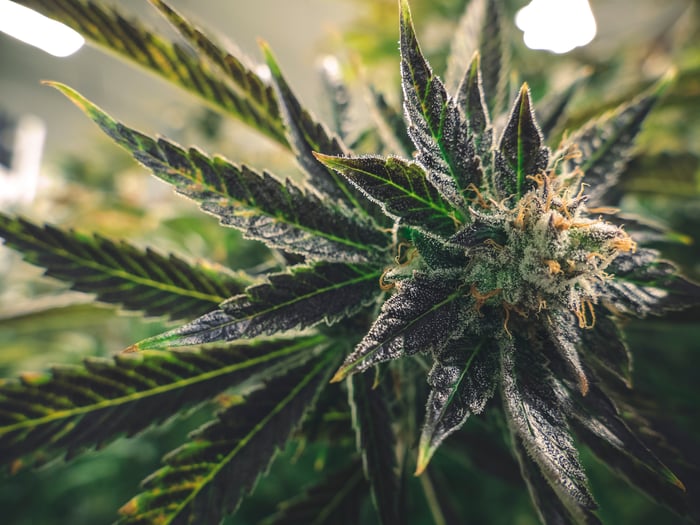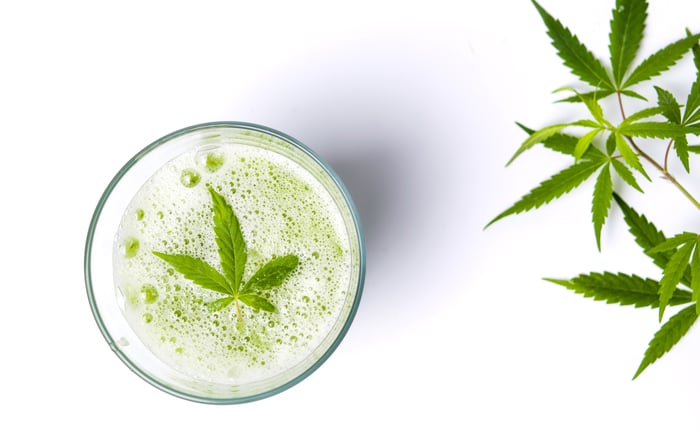The marijuana industry is budding before our eyes. Last year, Canada became the first industrialized country in the world to give the green light to recreational marijuana, validating the industry's business model and demonstrating that legal cannabis will be here for many decades to come.
To Canada's south, we've now seen two-thirds of all U.S. states legalize marijuana in some capacity, with 10 states allowing for legal adult consumption. To boot, the Food and Drug Administration approved its very first cannabis-derived drug, and President Trump signed the Farm Bill into law in December, legalizing hemp and hemp-based cannabidiol products.

Image source: Getty Images.
Millennials' favorite stock is...a marijuana company?
Although it's an industry that'll find consumers of all ages, support for the cannabis industry primarily comes from the younger generation. I'm looking at you, millennials.
Back in April 2018, the independent Quinnipiac University conducted a study and found that 63% of respondents favored legalizing pot nationwide. However, support for legalization was just 43% for seniors aged 65 and up, and 63% for those aged 50 to 64. Comparably, 82% of millennials aged 18 to 34 were in favor of legalization.
But what you may not realize is just how enamored millennials really are with marijuana. Markets Insider, a division of Business Insider, reported this past week that more people own shares of Aurora Cannabis (ACB -6.05%) than Apple on Robinhood, a free trading app that's particularly popular among millennials.
According to Markets Insider data, 247,157 Robinhood users own shares of Aurora Cannabis in their accounts, up 20,000 from the previous week. Meanwhile, Apple, which had held the top position for almost three months, fell to second with 237,050 shareholders. For added context, Aurora Cannabis was only the 22nd most popular stock on Robinhood in October, when Aurora Cannabis uplisted from the over-the-counter exchange to the New York Stock Exchange.

Image source: Getty Images.
Here's why millennials are infatuated with Aurora Cannabis
Why Aurora Cannabis?
To begin with, it's on track to be the largest producer of cannabis once it's running on all cylinders. Currently producing at an annual run rate of 100,000 kilograms a year, the company has suggested it's capable of producing more than 500,000 kilos at its peak. However, this language was used prior to the completion of its ICC Labs acquisition in South America, which added 92,000 square feet of existing capacity and approximately 1.1 million square feet of under-construction greenhouses. In my view, around 700,000 kilograms at its peak is more likely. As a top-producing grower, Aurora should attract plenty of long-term supply deals.
The company also looks ripe for a partnership. In September, it was reported that Coca-Cola (KO -0.14%) was in discussion with Aurora to either make an equity investment or forge a joint venture. Coca-Cola isn't oblivious to the fact that cannabidiol-infused beverages could be a hot commodity throughout North America in the years to come, and finding a large partner is pertinent to reaching this market. Ultimately, Coca-Cola walked away without a deal and has suggested it'll be monitoring the industry from the sidelines. But if Aurora was drawing interest from Coca-Cola, a partnership with a brand-name beverage company is coming probably sooner than later.
Aurora Cannabis also has breadth and product diversity on its side. It has a presence in close to two dozen countries and is actively working on moving beyond its reliance on dried cannabis flower. It's introduced a line of softgel capsules, intends to enter the infused beverage market later this year (when Canada gives alternative consumption options the green light), and has plans to enter the U.S. hemp market in the months to come. These alternative cannabis products are the key to higher operating margins.

Image source: Getty Images.
Millennials have chosen...poorly
So, millennials have chosen a surefire winner, right? Well, not exactly. To be honest, I feel pretty bad for millennials if they're choosing Aurora Cannabis over thousands of other potential investments.
Since the beginning of 2018, Aurora Cannabis' market cap has increased by a whopping 138%. This is the result of it purchasing CanniMed Therapeutics for $852 million, acquiring MedReleaf for $2.5 billion, and buying ICC Labs for $221 million. But the company's share price has declined by 3% over that same time frame -- an underperformance of 141 percentage points. How does a gap this large get created? The simple answer is share-based dilution.
Until recently, Canadian pot stocks had little to no access to basic banking services. This meant no nondilutive forms of financing, such as lines of credit or loans. Needing cash to expand their growing capacity and finance acquisitions, most marijuana stocks turned to bought-deal offerings. This is where common stock, convertible debentures, stock options, and/or warrants are sold to raise capital. The good news is that issuing shares has been successful in raising capital for the industry. The bad news is that it's crushed shareholders, as is evidenced in this instance.
Because Aurora Cannabis is contending with persistent net cash outflows, it's relied on issuing stock to cover its acquisitions, as well as, in large part, to fund its operational expansion. With the exception of a small cash component in the CanniMed deal, all of its other big acquisitions have been financed by issuing shares. In less than five years, the company's outstanding share count has ballooned from 16 million to what'll likely be 1 billion-plus within the next quarter or two. This type of dilution is killing investor value, and it'll have a largely negative impact on earnings per share.
Check out all our earnings call transcripts.
Even if Aurora Cannabis is able to generate an operating profit in the quarters to come, its ballooning share count will ensure that it translates into a not-so-meaningful earnings-per-share figure. It could take years before Aurora Cannabis is valued at a forward price-to-earnings ratio that's even remotely palatable to fundamentally focused investors.
Needless to say, this investor believes millennials could be sorely disappointed with their favorite stock.





